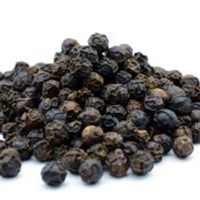Bioperine is a black pepper extract that can be used to make nutrients more available in one’s body.
What is Bioperine?
- BioPerine is a natural ingredient, which significantly improves bioavailability and benefits of nutritive compounds
- BioPerine is a patented standardized extract from the fruits of Piper nigrum (black pepper)
- BioPerine is GRAS (Generally Recognized As Safe)
What is the active ingredient?
- The active ingredient is piperine, a pungent alkaloid
How pure is BioPerine?
- BioPerine contains 95 to 99% pure piperine
Why is BioPerine superior to black pepper?
- Piperine content in BioPerine is much higher (95-99% pure piperine) than it is in black pepper; Piperine is only 3-9% in all parts of black pepper
- A standardized extract allows a wide range of applications other than the traditional use of black pepper
What are the potential nutraceutical benefits of BioPerine?
- BioPerine offers a wide range of health benefits. Improving the bioavailablity of nutritional substances is the primary benefit among them
How does piperine enhance the bioavailability of nutritive substances?
There are a few theories about BioPerine’s mechanism of action:
- Piperine interferes with substance-converting enzymes, such as UDP-glucuronyltransferase in the small intestine and liver. The excretion of the nutritional ingredients by the kidneys is blocked because the natural state of the nutritional ingredients is less soluble and their excretion through the urine is less efficient
- Vanilloid receptors are G protein coupled and highly expressed on afferent neurons of the gastrointestinal (GI) tract. Piperine binding to vanilloid receptors activates membrane‐bound adenyl cyclase, which catalyzes the synthesis of the second messenger molecule cAMP. cAMP activates protein kinase A (PKA) that inhibits intestinal motility and dilates blood vessels of the intestine. This physiological action may cause better digestion and absorption
- Piperine is likely to facilitate the absorption of nutrients interacting with the ultrastructure of intestinal brush border and stimulating digestive enzymes
What nutritional ingredients’ bioavailability is enhanced by BioPerine?
BioPerine has been shown to enhance the bioavailability of the following groups of nutrients in humans and animals:
- Resveratrol
- Herbal extracts (curcumin, ashwaganda, capsaicin, Gingko biloba)
- Water soluble vitamins (vitamin B1, B2, B6, B12, niacinamide, folic acid and vitamin C)
- Fat-soluble vitamins (vitamin A, D, E and K)
- Antioxidants (vitamin A, C, E,alpha-‐carotene, transbeta‐carotene, lycopene, lutein/zeaxantin, pine bark bioflavanoids complex, germanium, selenium and zinc)
- Amino acids (lysine, isoleucine, leucine, threonine, valine, tryptophan, phenylalanine and methionine)
- Minerals (calcium, iron, zinc, vanadium, selenium, chromium, iodine, potassium, manganese, copper and magnesium)
Is the bioavailability of all of these ingredients tested in humans?
The bioavailability of resveratrol, selenomethionine, vitamin B6 and C, CoQ10, beta carotene and curcumin were evaluated in humans with the administration of Sabinsa’s BioPerine as follows:
- One group of people took the ingredients with BioPerine
- The other group took the ingredients alone
- The blood levels of the ingredients were significantly higher among those who have taken the ingredients with BioPerine.
- The study was conducted in the US among healthy volunteers
What about piperine’s impact on drug bioavailability?
- Piperine may or may not affect drug bioavailability. For instance, piperine improves the bioavailability of ampicillin and norfloxacin, which are antibiotics with low oral bioavailability. It certainly depends on drug chemistry and pharmacokinetics. Therefore, this should be discussed with your physician or health care provider
What are the other physiological effects of piperine?
Extensive data is collected reporting black pepper’s health benefits other than natural bioenhancer properties, such as
- Antidepressant *
- Antiapoptotic *
- Antioxidant *
- Anti-platelet effect *
- Asthma relieving *
- Anti-inflammatory activity *
- Antihypertensive effect *
- Hepatoprotective effect *
- Antithyroid effect *
- Fertility enhancer *
- Antitumor activity *
Is the plant sustainably harvested?
- Yes, piperine is extracted from sustainably‐grown Piper nigrum
Is BioPerine GMO?
- No, BioPerine is not genetically-modified
What about Allergen‐free, Kosher and Halal certifications?
- Sabinsa’s most ingredients are Kosher and Halal certified as well as Allergen free
Is BioPerine an ODI (Old Dietary Ingredient)?
- Yes, BioPerine is an Old Dietary Ingredient.
- BioPerine can therefore be marketed immediately, without the need for pre‐market NDI notification
What is the suggested daily dose?
- The suggested dose is 5 mg 3 times daily.
Is BioPerine manufactured in a cGMP facility?
- Sabinsa’s manufacturing facilities are cGMPand located in India
- They are FDA‐inspected and passed
Is Sabinsa’s BioPerine patented?
- Yes, BioPerine is a globally patented and trademarked ingredient
- Please see bioperine.com/patent
Where I can find more information on BioPerine?
- For more information visit bioperine.com
* These statements have not been evaluated by the Food and Drug Administration. These products are not meant to diagnose, treat, cure, mitigate or prevent any disease or medical condition.


